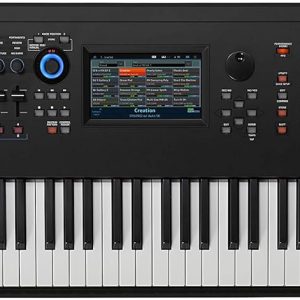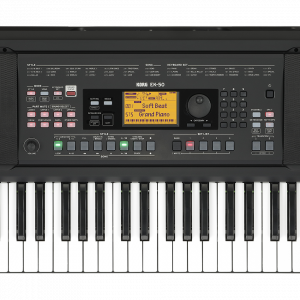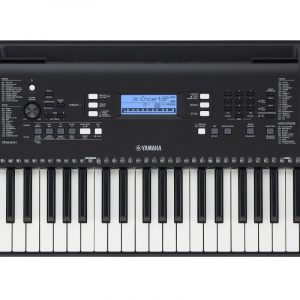Novation Bass Station Review
We rated this synthesizer a full 10/10. While monophonic/paraphonic synths only play one to two note at a time, that doesn’t mean that they’ll spark less creativity!
We found that the Novation Bass Station was a beautiful station with an intuitive design and an (especially) impressive arpeggiator. If you are a rock or electronic instrument in the market for a small synth that will help propel your creative flow, then look no further than this model! The Novation Bass Station is a portable and timeless little synth that has powerful bass sounds…plus, it has a build that will last you a lifetime.
$499.99
We rated this synthesizer a full 10/10. While monophonic/paraphonic synths only play one to two note at a time, that doesn’t mean that they’ll spark less creativity!
We found that the Novation Bass Station was a beautiful station with an intuitive design and an (especially) impressive arpeggiator. If you are a rock or electronic instrument in the market for a small synth that will help propel your creative flow, then look no further than this model! The Novation Bass Station is a portable and timeless little synth that has powerful bass sounds…plus, it has a build that will last you a lifetime.
Bass Station: Overview

The Novation Bass Station is a monophonic, 25-key synthesizer that is a creative powerhouse. Often described as “Classic” this mono synth comes at a surprisingly low price and is extremely portable. Plus with its hundreds of preset patches, versatile arpeggiator, and stunning step sequencer, it’s no wonder why big-name bands like Radiohead have taken to the model. As a whole, this instrument is very popular among both electronic musicians and rock musicians.
The Novation Bass Station II was first released in 2013 and is the updated version of a monophonic synth which was released in the early 90’s (the dual oscillator mono synth)…Actually, the first Bass Station per se was released 20 years ago and was a huge deal as it allowed musicians to control sound in real-time (For more info visit this article called The Bass Station Story Here… (but for now, let’s just focus on the Bass Station II!).
So, let’s see what this little 25-key instrument is capable of by checking out the features down below.
Features
2 Analog Oscillators
Both analog oscillators are tuneable, and the sub-oscillator is tuneable to non-octave tracking intervals. You can sync the oscillators together in different ways to get entirely different sonic results. For example, if you hard-sync the two together, you can get that iconic huge bass sound with large amount of ‘umph’ or rather, punchiness (hence the name, Bass Station!). The Bass Station 2.5 is technically a paraphonic synth (more on this later on) so you can actually play two notes at once if you like (using one from each synth).
Plenty of Patches
64 factory patches plus 64 user presets meaning that there is a total of 128 patches available on the instrument.
2 Effects
There are just a couple of effects onboard: distortion and Oscillator FM. Oscillator FM (frequency modulation) can use both oscillators to create bright/warm and sometimes even bell-like sounds.
Apreggiator, 32-Step Sequencer
The combination of the instruments arpeggiator and step sequencer results in a creative powerhouse, as I mentioned earlier! Many musicians use the Bass Station to get ideas for their songs. I’m especially fond of the capabilities of the arpeggiators. Also, there are 32 different rhythms/patterns inside the instrument. I
I have found that when it comes to writing a song, just getting that basic beat and a melody can get you set up for hours of songwriting. It’s almost as if, once you have some sound to base everything off of, the tunes write themselves. That’s the beauty of having an instrument like this.
Wide Variety of Synth Sounds
Advertised as having “enormous” bass sounds and also is capable of “shrieking leads” depending on what settings you use.
Class Compliant (AKA Plug and Play)
Since the Novation Bass Station is class-compliant, it’s extremely easy to connect it to other devices/systems. Class compliant means that drivers aren’t necessary- so say goodbye to extra downloads and hassle- just make music instead.
Specifications

- Number of keys: 25
- Type of synth: monophonic
- Weight: Approximately 5 pounds
Who is it suitable for?
The Novation Bass Station is best suited for songwriters and performers who are in the electronic and rock genres. If you’re looking for anything from mellow bass lines to eerie low tones, then this model is for you.
The Bass Station in Action / The Novation 2.5
Novation’s newest update to the Bass Station (The Bass Station 2.5) includes:
- A new mode (paraphonic mode)
- Oscillator error feature
- A microtune edit mode
- Envelope retriggering
Paraphonic means that each oscillator can be controlled separately- Allowing for multiple notes to be played. In this case, the Novation Bass Station 2.5 allows you to play 2 notes at a time, rather than just 1 (that is, as long as you get the upgrade, of course…and all running through just one filter).
This Soundcloud sample by the company shows how versatile the synth is: From booming EDM beats to grimy squalls and smooth beats, it’s crazy to think that all these feelings and samples came from a track with barely any post-processing.
Pros and Cons

Pros
- This model is set up to give you enormous bass sounds
- Mono synths give you a different creative result than writing on poly synths
- Light enough to wear on your person
- Portable yet packs a punch
- It has a large variety of sounds
- Great for studios/songwriting/live performances
- It has aftertouch
- Patches are easy to tweak/fine-tune
- Capable of unique sounds and effects, such as portamento
- It can play up to two notes at a time with the new update
Aftertouch can be quite hard to come by in sub-$500 models, so I was very pleased to learn that the Novation Bass Station had it. The paraphonic mode was a lovely touch to the ‘.5’ update, Overall the instrument performs extremely well and has a sturdy chassis.
The addition of aftertouch makes the Bass Station more expressive than most other little synths, plus this model fills the niche void of rich bass sounds.
Cons
- It’s monophonic (unless you get the 2.5 version with the paraphonic upgrade)
- It’s over 10 years since its release
Since this instrument is monophonic, it is less expensive than the (polyphonic) alternatives. This means you can get a little instrument that sounds great, for just $500. Personally, I love my synths with polyphony, but I could see myself using a Bass Station for songwriting sessions, at the very least. Sometimes less is more when it comes to writing- limitations can be creatively freeing, but obviously, if you’re looking for a poly synth, this won’t be the instrument for you.
What this model lacks in polyphony it makes up for in variety. Another small con I’d like to point out is that this synth might be popular, but it isn’t particularly new. While this doesn’t bother me (especially since the model has such great connectivity) some folks may want something that was released in the past couple of years, rather than a decade ago. Luckily, the model was updated to a 2.5 version in 2018 (with the company taking user feedback into account), so it’s not entirely without revisions!).
Side note: If you have a Bass Station II, I just learned that you can upgrade it to a Bass Station 2.5 by visiting the Korg site and downloading the software.
Artists Who Have Used the Novation Bass Station
The first group that comes to mind when I think of the Novation Bass Station is Radiohead. For example, one of the songs off Ok Computer used the Novation Bass Statiion. Listen to the unsettling tune!
Other artists who have used this model (or Bass Stations similar to it) include Nine Inch Nails, Bonobo, and the electronic duo Orbital. Nine Inch Nails’ bassline to the song “Closer” was recorded on the Novation Bass Station, and Paul Hartnoll used the instrument to help put the finishing touches on one of his more recent albums (In the Studio with Orbital’s Paul Hartnoll).
Comparable Instruments
Some of the earlier iterations of the Novation Bass Station were created to mimic Roland’s synths, so as far as competitors go, the Roland brand is a great place to look. However, keep in mind that a lot of these comparable synths aren’t really as good at producing those fat, rich bass sounds (hence the name of this model and its target audience!)
As a whole, other synths worth checking out include…
- The Mother-32 by Moog (this one is analog)
- Korg Monologue (check out this video by synth pro Starsky Carr in regards to the Bass Station II vs. Korg Monologue here )
- The MicroKorg
Photo credit: Amazon.com
The Moog Mother-32 is a semi-modular analog synthesizer- in fact, it’s the first tabletop Moog synth of its kind. The setup is completely unlike the bass station (no keys, for starters!) but its price point ($599) and weight (5 pounds) are similar. Like the model we reviewed today, I’ve found that the Mother-32 has been said to elicit lots of creative flow.
According to Amazon and the maker…
“The Moog Mother-32 is the first tabletop semi-modular synthesizer from Moog. It is a distinctive analog instrument that adds raw analog sound, sequencing, and extensive interconnectivity to any electronic or modular ecosystem. This expansive new live performance and production instrument is handcrafted in Asheville, NC, and has been meticulously designed to provide musicians with a diverse array of creative tools to inspire new music, unique sound, and endless sonic exploration.
Mother-32 comes secured in a rugged extruded aluminum enclosure with wood sides and features a voltage-controlled 32-step sequencer with 64 sequence locations, definitive Moog low pass and high pass Ladder Filter, 2 voltage-controlled mixers, a classic Moog oscillator with dual outputs, wide-range LFO with audio-rate modulation capability, MIDI input and MIDI to CV conversion, white noise, a modular patch bay with 32 patch-points for extended synthesis complexity and an assignable CV jack with 16 assignable sources.” -Amazon/Moog
Photo credit: Amazon.com
The Korg Monologue is probably the most comparable instrument you’re going to find to the Bass Station. This one is a 25-key mono synth with 80 presets onboard. This model actually costs less (at about $350) and is worth checking out- especially if you’re budget is a bit lower, or if you prefer Korgs over Novations.
Photo credit: Amazon.com
While the MicroKorg and the Bass Station are completely different beasts, I thought that it was worth mentioning that a lot of folks who own synths end up getting both for different purposes. The MircoKorg is a synthesizer and vocoder built into one. The expanded PCM version costs about $450. It has great vintage sounds, and it comes with a microphone.
Quick View
| Keys | 25 keys |
| Touch sensitivity | No
Aftertouch |
| Sounds | 64 preset patches, 2 oscillators |
| Recording capabilities | C MIDI/USB |
| Metronome | Unknown |
| Polyphony | Monophonic, also has a paraphonic mode |
| Speakers | No |
| Headphones | 1 x ¼ inch input |
| Accessories | User manual, power cord (9 volt DC) |
| Price point | $450-499.99 |
Novation Bass Station: Conclusion
Thanks for sticking around until the end of this Novation Bass Station review.
In conclusion, the Bass Station is a small but mighty analog synth that will spark creative ideas in any songwriter. It meets the needs of its intended audience superbly well! Its variety and power of bass sounds, connectivity, and level of inspiration it propagates are top of line. To close- it’s iconic…hard to beat, and at best, difficult for competitors to even come close to.
Music Quote of the week:
“You write to become immortal, or because the piano happens to be open, or you’ve looked into a pair of beautiful eyes.” – Robert Schumann





 We rated this synthesizer a full 10/10. While monophonic/paraphonic synths only play one to two note at a time, that doesn’t mean that they’ll spark less creativity!
We found that the Novation Bass Station was a beautiful station with an intuitive design and an (especially) impressive arpeggiator. If you are a rock or electronic instrument in the market for a small synth that will help propel your creative flow, then look no further than this model! The Novation Bass Station is a portable and timeless little synth that has powerful bass sounds…plus, it has a build that will last you a lifetime.
We rated this synthesizer a full 10/10. While monophonic/paraphonic synths only play one to two note at a time, that doesn’t mean that they’ll spark less creativity!
We found that the Novation Bass Station was a beautiful station with an intuitive design and an (especially) impressive arpeggiator. If you are a rock or electronic instrument in the market for a small synth that will help propel your creative flow, then look no further than this model! The Novation Bass Station is a portable and timeless little synth that has powerful bass sounds…plus, it has a build that will last you a lifetime. 



There are no reviews yet.